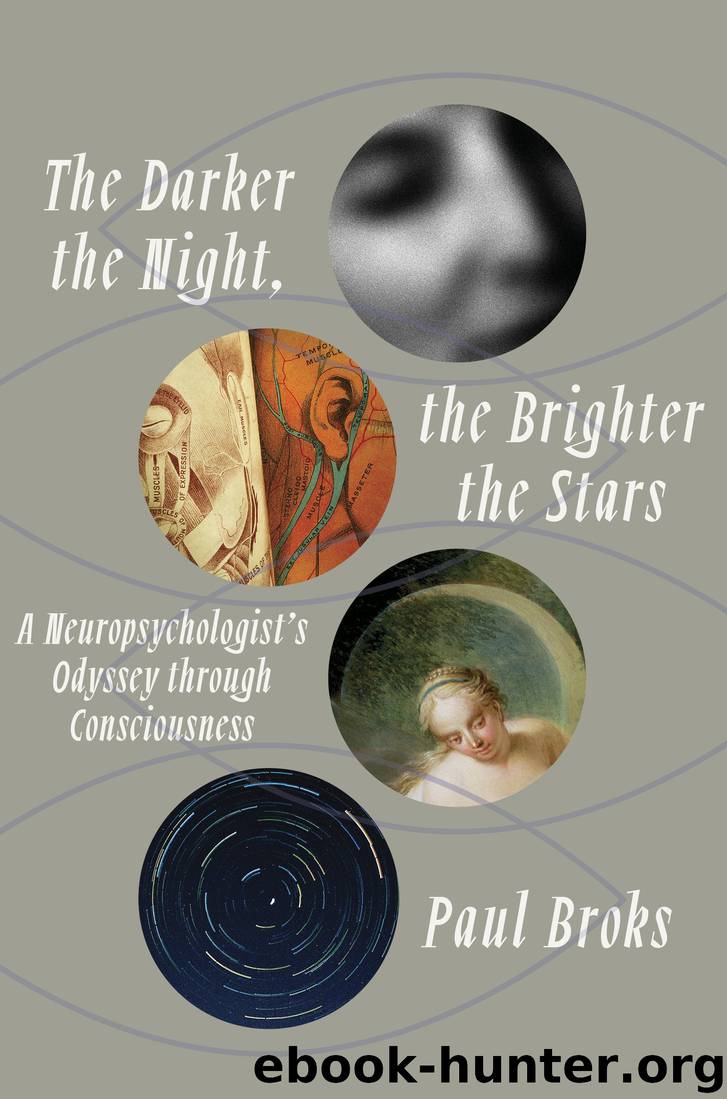The Darker the Night, the Brighter the Stars: A Neuropsychologist's Odyssey Through Consciousness by Paul Broks

Author:Paul Broks
Language: eng
Format: epub
Tags: Biographies & Memoirs, Cognitive Psychology & Cognition, Life Sciences, Medical, Neuroscience, Psychology, Science
Publisher: Crown
Published: 2018-07-03T03:00:00+00:00
Coda
In his book The Demon-Haunted World, a paean to science and skepticism, Carl Sagan writes of a yearning to communicate with his dead parents. He misses them terribly and longs to believe that something of them still exists, some essence, some element of personality. What wouldn’t he give for even five or ten minutes a year, to tell them about their grandchildren, to share his news, to give them his love? Irrationally, a part of him wonders how they are. “Is everything all right?” I feel the same about Kate. How I would love to tell her about the grandchildren, the ones she knew, the one she didn’t, the one currently under construction. I see her smiling face in my mind’s eye. The boys? You’d be proud. Me? Fine. I still get those…I call them stabs of absence. But, you know. She rests a hand on mine, gives it a squeeze. Like Sagan with his parents, a part of me wonders how she is. He knew, and I accept, that nothing remains, and yet the sense that something does never goes away. It’s a fundamental, nuclear, part of how we relate to people even when they no longer exist.
Sagan didn’t believe in an afterlife and nor do I, but, in line with the teachings of the major religions, most people do. It is widely presumed that at death the soul transfers from the body to a non-physical realm of heavenly bliss, or somewhere less desirable, for all eternity. Or, alternatively, having left one body it returns to the earthly realm to occupy another, human or animal. These are supernatural beliefs and you might think that any survival of consciousness and personality after death necessarily involves the supernatural, but Douglas Hofstadter, a distinguished cognitive scientist, speculates otherwise. He is able to conceive of a survival of personal consciousness after death that is entirely natural.
The son of a Nobel Prize–winning physicist, Hofstadter had achieved his own considerable success as an author and scientist with research interests focusing on the philosophy of mind, and especially the cognitive underpinnings of the sense of self. His book, Gödel, Escher, Bach (“GEB”), tagged “a metaphorical fugue on minds and machines,” won the 1980 Pulitzer Prize for general nonfiction. Then, in December 1993, tragedy struck. His beloved wife, Carol, died quite suddenly and unexpectedly of a brain tumor. What hit him the hardest, he says, was not his own personal loss, which was considerable, but, rather, Carol’s: the sudden obliteration of her consciousness, and the loss of a future life so rich in promise. Struggling to come to terms with it all he turned to his close friend and colleague, Daniel Dennett, with whom some years earlier he had co-edited a book called The Mind’s I (which, incidentally, Kate had given me as a Christmas present when it first came out, thereby galvanizing my own interests in the neuropsychology of selfhood). They communicated by email because Hofstadter was on sabbatical in Italy at the time and Dennett was back in Massachusetts.
Download
This site does not store any files on its server. We only index and link to content provided by other sites. Please contact the content providers to delete copyright contents if any and email us, we'll remove relevant links or contents immediately.
Hit Refresh by Satya Nadella(9115)
When Breath Becomes Air by Paul Kalanithi(8415)
The Girl Without a Voice by Casey Watson(7877)
A Court of Wings and Ruin by Sarah J. Maas(7799)
Do No Harm Stories of Life, Death and Brain Surgery by Henry Marsh(6929)
Shoe Dog by Phil Knight(5252)
The Rules Do Not Apply by Ariel Levy(4946)
A Higher Loyalty: Truth, Lies, and Leadership by James Comey(4942)
Hunger by Roxane Gay(4919)
Tuesdays with Morrie by Mitch Albom(4762)
Everything Happens for a Reason by Kate Bowler(4726)
The Immortal Life of Henrietta Lacks by Rebecca Skloot(4569)
Millionaire: The Philanderer, Gambler, and Duelist Who Invented Modern Finance by Janet Gleeson(4455)
How to Change Your Mind by Michael Pollan(4343)
All Creatures Great and Small by James Herriot(4301)
The Money Culture by Michael Lewis(4182)
Man and His Symbols by Carl Gustav Jung(4118)
Elon Musk by Ashlee Vance(4115)
Tokyo Vice: An American Reporter on the Police Beat in Japan by Jake Adelstein(3971)
